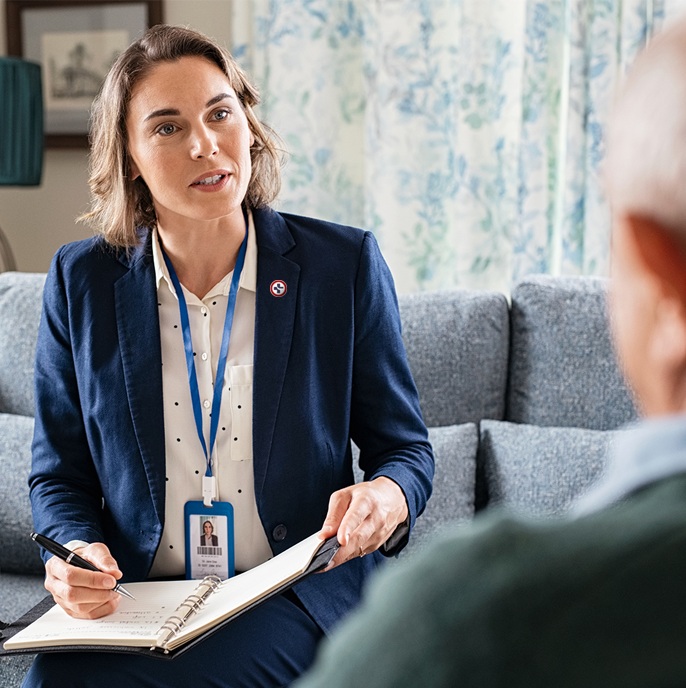Greater National Advocates is a Non-Profit Determined to Improve the Patient Experience

Having an experienced professional in your corner can make all the difference in the world
Don’t Become a Statistic
Diagnosis Mistakes
More than half the U.S. population will suffer from at least one wrong or delayed diagnosis during their life, according to a report published by The Institute of Medicine.
Preventable Harm
The National Academy of Medicine predicts as many as one-third of all hospitalized patients will suffer some form of preventable harm during their hospital stay.
Dangerous Shortcuts
84% of all doctors surveyed by The American Association of Critical Care Nurses have observed colleagues taking dangerous shortcuts when caring for patients.
Medical Error Deaths
Medical Error remains one of the leading causes of death in the United States according to a Johns Hopkins University study from 2016 and reafirmed every year since.
What to expect from an Independent Patient Advocate
Independent Patient Advocates provide guidance and support for patients and loved ones struggling to manage a healthcare-related problem or medical crisis. These dedicated professionals are not employed by hospitals or insurance companies, meaning they are free from the constraints and restrictions that often limit the availability of resources.
Upon being hired, an Independent Patient Advocate will listen to your concerns, and use their knowledge of the healthcare system to help coordinate treatment, fight for benefits, improve communication with the healthcare team, address patient safety, and improve patient care.

How to find the right Advocate for your situation
Independent Patient Advocates come from diverse backgrounds with different skillsets. Many are former healthcare professionals who know the "ins and outs" of the medical system. Others have experience in billing, insurance, caring for aging adults, or as mentors for people living with a disability or chronic illness.
When searching for an advocate, begin by selecting the type of advocacy specialty that best aligns with your needs. Next, review the resulting list of profiles and determine which professionals match your cirtieria. Finally, interview the candidates that are most suitable, and decide which advocate is right for you.


Ethical Standards
Every advocate listed in the GNA directory has agreed to abide by the Collaborative Code of Ethics For Patient & Health Care Advocates. BCPA-credentialed Advocates also adhere to the Code of Responsibility of the Patient Advocate Certification Board.
Frequently Asked Questions
Why isn’t it a good idea to advocate for yourself during a health crisis or emergency?
Patients and their loved ones are always at a disadvantage when it comes to making decisions about medical care. A complicated diagnosis, unexpected decline in health, or traumatic injury can make it nearly impossible for patients and families to advocate for themselves. There are barriers and obstacles around every corner. Sometimes it’s hard getting answers to the most basic questions.
Advocating for yourself as a patient is often problematic for several reasons. First, our healthcare system is complex and intimidating. It can be extremely challenging for patients and their loved ones to make informed decisions, especially during periods of uncertainty like when it’s time to be discharged or when it’s unclear whether a test or procedure will be approved.
Furthermore, patients don’t always have access to everything they need in order to make informed decisions, such as their complete medical records, information about treatment options, and the availability of clinical trials.
These factors can make it extremely difficult for patients and their families to effectively advocate for themselves. The right Independent Patient Advocate, however, can step in, take charge, and help patients and loved ones speak up when friends and family just aren’t enough.
Why not just rely on the patient advocate who works for the hospital?
Everyone employed by a health care company is limited to what they can accomplish for patients and families. Hospital-employed patient advocates, navigators, social workers, and discharge planners are no different. They have heavy caseloads and work long hours with limited resources. Independent Patient Advocates, however, work one on one with patients and loved ones to explore options, improve communication, and coordinate with overworked hospital staff. In fact, many Independent Patient Advocates used to work for hospitals and healthcare companies before they decided to work directly for patients.
Hospital-employed patient advocates are also beholden to hospital policies and procedures. Because they are accountable to hospital administration, they can be restricted in their ability to advocate beyond rigid corporate guidelines. Independent Patient Advocates, on the other hand, can be more objective because they are not associated with a specific healthcare provider and are not financially dependent on any one organization. They can often provide a wider range of services and have more freedom to advocate for patients and their loved ones.
What is the education and training of Independent Patient Advocates?
The education and training of Independent Patient Advocates can vary widely. Some Independent Patient Advocates have backgrounds in healthcare, such as nursing, social work, or healthcare administration. Others have experience in insurance, rare disease, or as caregivers for loved ones. A growing number of Independent Patient Advocates are patients and survivors who have mentored others who are experiencing injuries and illnesses similar to theirs.
The Patient Advocate Certification Board (PACB) is a relatively new credentialing body for the profession. Independent Patient Advocates who have been certified by the PACB proudly display the BCPA credentials on their profile page.
Regardless of background, education, or certification, Independent Patient Advocates receive ongoing training in areas such as patient rights, healthcare systems, medical terminology, and advocacy techniques. They routinely attend workshops, conferences, and other professional development opportunities to stay up-to-date with the latest advances in healthcare and patient advocacy.
Who pays for Independent Patient Advocates?
Independent Patient Advocates are not yet covered by health insurance. They are hired directly by patients and their loved ones to provide individualized guidance and support that the traditional healthcare system is not equipped to handle.
The private-pay arrangement ensures that advocates remain independent and free from the influence of insurance companies and hospital facilities, whose interests are often not aligned with the patient's. Many advocates offer free consultations, sliding scale payment arrangements, and pro bono services, but most cannot sustain their businesses without charging fees.
Some health insurance plans provide limited coverage for non-medical services, such as case management or care coordination, and some offer coverage and make exceptions for Independent Patient Advocates in specific situations, such as for patients with complex medical conditions.
Employers have started offering patient advocacy services to their employees, and some labor unions and churches are also providing this support. As of January 2024, Medicare and Medicaid have started to pay for Independent Patient Advocacy services in certain situations. Please inquire if any of these options are available for you.
Why isn’t Independent Patient Advocacy covered by health insurance?
Independent Patient Advocates are not covered by health insurance for a couple notable reasons. First, health insurance companies are unwilling to pay Independent Patient Advocates to fight against their own policies and decisions. It is simply not in the best interests of health insurance companies to pay for Independent Patient Advocates.
In addition, many health insurance companies are reluctant to include Independent Patient Advocacy as a medically necessary covered service. Some health insurance plans do provide limited coverage for non-medical services, such as case management or care coordination, and some health insurance plans may offer coverage and make exceptions for Independent Patient Advocates in specific situations, such as for patients with complex medical conditions.
Do employee benefit plans cover Independent Patient Advocacy?
Employee benefit plans and employee assistance programs may cover Independent Patient Advocacy, but coverage varies depending on the specific plan and the insurance provider. Some employee benefit plans may offer coverage for Independent Patient Advocacy services as part of their case management or care coordination services. However, coverage depends on the specific terms of the employee benefit plan.
If you are considering using the services of an Independent Patient Advocate and would like to see if your employee benefit plan covers these services, it's a good idea to check with your insurance provider or HR department for more information. They can provide you with a summary of your coverage and any specific limitations or restrictions that may apply.
What is an Independent Patient Advocate?
An Independent Patient Advocate is a professional who helps individuals navigate the healthcare system, ensuring they receive the best possible care. These advocates are often experienced physicians, nurses, and healthcare professionals who understand medical complexities and can assist with communication, coordination, and financial aspects of healthcare.
What does an Independent Patient Advocate do?
Independent Patient Advocates assist with making calls, scheduling appointments, and organizing medical records. They translate complex medical forms, coordinate communication between doctors, and provide guidance in navigating the healthcare system. They also help patients with insurance claims, negotiate billing issues, and offer emotional support during challenging times. Their primary role is to ensure that patients understand their diagnoses, treatment options, and rights while receiving the care they deserve.
How do I find an Independent Patient Advocate?
You can find an Independent Patient Advocate through professional directories, referrals from healthcare providers, or advocacy organizations. Many advocates offer remote services, allowing patients to access their assistance from anywhere in the U.S.
Why should I hire an Independent Patient Advocate?
Hiring an Independent Patient Advocate is beneficial for individuals who need assistance with medical bills, insurance disputes, or choosing the right health plan. Advocates can help patients who feel overwhelmed with a new diagnosis, need a second opinion, or require help coordinating care for an aging or ill loved one. They also support individuals seeking mental health treatment, those facing hospital stays, and anyone struggling to navigate the complexities of the healthcare system.
What is the difference between a hospital-employed advocate and an Independent Patient Advocate?
Hospital-employed and insurance company advocates work for their respective institutions, meaning their interests may align with their employer’s policies rather than the patient’s needs. Independent Patient Advocates, on the other hand, work directly for the patient and are solely committed to ensuring their client receives the best possible care and support
What are the main responsibilities of an Independent Patient Advocate?
Independent Patient Advocates attend medical appointments with patients to ask important questions and ensure they fully understand the information provided. They coordinate care among multiple healthcare providers, review and appeal denied insurance claims, and assist in negotiating medical bills. They also research treatment options, provide guidance on second opinions, and help patients transition between healthcare settings, such as from hospital care to home care. Additionally, they offer support to seniors in finding long-term care solutions and help caregivers access essential resources.
How much does it cost to hire an Independent Patient Advocate?
The cost of hiring an Independent Patient Advocate varies based on their experience, credentials, and the scope of services provided. Some advocates offer free initial consultations or sliding-scale fees, but in most cases, these services are paid out-of-pocket.
Is Independent Patient Advocacy covered by insurance?
Independent Patient Advocacy services are typically not covered by health insurance. However, some employers, labor unions, and organizations are beginning to offer advocacy services as an employee benefit. As of 2024, Medicare and Medicaid may cover advocacy services in specific situations.
What qualifications do Independent Patient Advocates have?
Independent Patient Advocates often have backgrounds in healthcare, nursing, social work, or insurance. Some have firsthand experience navigating the healthcare system for themselves or loved ones. While certification is not mandatory, many advocates obtain credentials from the Patient Advocate Certification Board (PACB) and earn the title of Board Certified Patient Advocate (BCPA).
What are the benefits of hiring an Independent Patient Advocate?
Hiring an Independent Patient Advocate provides personalized attention tailored to an individual’s healthcare needs. Because they are independent, they offer unbiased advocacy without conflicts of interest from hospitals or insurance companies. Their expertise in medical care, billing, and healthcare laws allows them to guide patients effectively, ensuring they receive the best care possible. Advocates provide continuity of care, working alongside patients throughout their healthcare journey, and empower them with the knowledge needed to make informed decisions.
How do Independent Patient Advocates improve healthcare experiences?
Independent Patient Advocates enhance healthcare experiences by acting as a liaison between patients and medical professionals. They help prevent treatment errors, reduce hospital readmissions by ensuring proper post-discharge care, and improve doctor-patient communication. Their guidance provides clarity on medical decisions and treatment options, alleviating patient stress and ensuring a smoother healthcare journey.
Who benefits the most from hiring an Independent Patient Advocate?
Individuals who are struggling with the complexities of the healthcare system benefit the most from hiring an Independent Patient Advocate. Seniors managing multiple health conditions, individuals with chronic illnesses or recent diagnoses, and patients dealing with insurance disputes or high medical bills can find valuable support through advocacy services. Caregivers responsible for a loved one’s care also benefit from having an advocate to assist in navigating healthcare decisions and responsibilities.
How do Independent Patient Advocates support caregivers?
Independent Patient Advocates provide caregivers with essential support by helping coordinate medical appointments, arranging treatments, and assisting with long-term care options. They guide families through end-of-life planning and advanced directives while offering resources to reduce the emotional and logistical burden caregivers often face.
Do doctors and hospitals support working with Independent Patient Advocates?
While some healthcare providers may be unfamiliar with Independent Patient Advocates, those who have worked with them recognize their value. Advocates help streamline doctor-patient communication, increase adherence to treatment plans, and ensure patients receive necessary care. Some hospitals even recommend that patients work with Independent Patient Advocates to improve health outcomes and reduce hospital readmissions.
